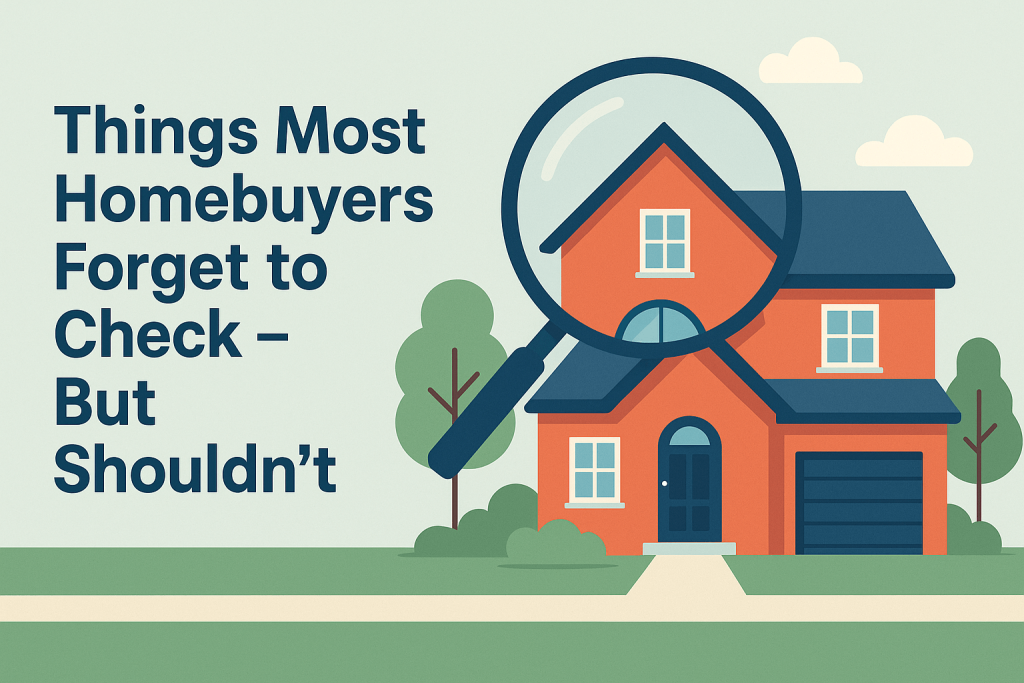Buying a home is one of the most exciting—and often overwhelming—experiences in life. Between neighborhood tours, open house visits, and financing logistics, it’s easy to get swept up in the process. But amid all the excitement, it’s crucial not to overlook some of the less obvious details that can impact your comfort, safety, and long-term investment.
While most buyers know to look at the roof, foundation, and appliances, there are several often-forgotten elements that can come back to haunt you if ignored. Whether you’re a first-time buyer or a seasoned homeowner upgrading to your next space, here are the key things you shouldn’t forget to check before signing on the dotted line.

1. HVAC System: Age, Maintenance, and Airflow
One of the most commonly overlooked (but most essential) systems in any home is the HVAC system. Heating and cooling account for a large portion of your home’s energy use—and your monthly utility bills.
Before you buy, ask about:
- The age of the HVAC system: A typical system lasts 15–20 years. If it’s nearing the end of its life, factor replacement costs into your offer.
- Maintenance records: Regular tune-ups and cleanings extend system life and improve efficiency. If the seller doesn’t have any service documentation, that could be a red flag.
- Airflow and ductwork condition: Uneven heating or cooling across rooms may indicate blocked ducts, poor system design, or insulation problems.
In climates like Idaho Falls, where temperatures swing from bitterly cold winters to hot, dry summers, HVAC performance is not just a convenience—it’s a necessity. A properly functioning HVAC Idaho Falls system ensures year-round comfort and can save you significant money over time.
2. Water Heater Condition
Water heaters are easy to ignore—until they break. Ask about the unit’s age, maintenance history, and capacity. For example, a 15-year-old water heater may not be worth keeping, even if it still works. It’s also a good idea to inspect for rust, leaks, or unusual noises.
3. Attic Insulation and Ventilation
Attic insulation may not be glamorous, but it makes a big impact on energy efficiency and indoor comfort. Poor insulation means your HVAC system works harder, leading to higher bills. While you’re at it, check the attic ventilation. Good airflow helps prevent moisture buildup and prolongs the life of your roof.
4. Electrical Panel and Outlets
Older homes may have outdated electrical panels or too few outlets to support modern electronics and appliances. Check for signs of overloaded circuits, such as buzzing sounds, flickering lights, or warm outlet covers. Also, confirm that there are GFCI outlets in areas where water is present (bathrooms, kitchens, garages).
5. Plumbing: More Than Just Leaks
A quick check under the sinks doesn’t give you the full picture. Find out the age of the pipes—especially in older homes, where galvanized pipes may be corroding inside. Ask about water pressure, drainage speed, and whether the home has experienced any history of water damage or pipe freezing.
6. Windows and Doors
Drafty windows and doors are common in older homes and can add up to significant heating and cooling costs. Open and close each window and door to check for proper sealing, smooth operation, and signs of water intrusion or rot.
7. Cell Service and Internet Options
It may sound trivial until you move in and realize you have one bar of service and no access to high-speed internet. Test your phone in different areas of the home, and check with local internet providers about available service plans.
8. Neighborhood Noise and Traffic Patterns
Visit the home at different times of day to gauge noise levels and traffic patterns. That quiet cul-de-sac may turn into a busy school pickup zone at 3 p.m. Small factors like these can have a major impact on your day-to-day living experience.
Why It All Matters
Buying a home is more than choosing the right layout or a beautiful kitchen—it’s about ensuring the systems behind the walls are just as sound as the surface. Taking time to dig into these details can save you from unexpected repairs, high utility bills, or uncomfortable surprises after move-in.
And when it comes to home comfort, don’t underestimate the value of a reliable HVAC system—especially in places like Idaho Falls. A properly maintained HVAC Idaho Falls unit not only keeps you cozy in winter and cool in summer, but also protects your investment for years to come.
So before you make your final decision, make sure these easy-to-miss items are part of your home inspection checklist. Your future self—and your wallet—will thank you.